The Best Movies of 2020
Peter Breedveld
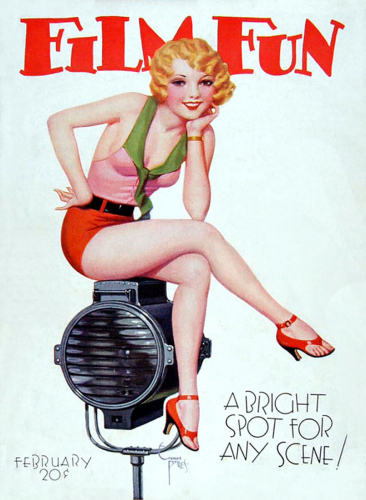
Illustratie: Enoch Bolles
When you watch as many films as I do it’s almost impossible to choose ten movies which you think are the absolute best. I’m pretty sure about the first three but as for the rest? On another day, in another mood I would have included Lucía Alemany’s Inocencia or Une fille facile by Rebecca Zlotowski. Just this week I saw Never Rarely Sometimes Always by Eliza Hittman, also moving and wonderful. I should make a top 25 of favorite movies, then I would be able to include all the movies I really loved, but that’s too much work for me, sorry.
So here follow ten movies I think at this very moment are the very best of this past year.
10: Andrew Patterson: ‘The Vast of Night‘
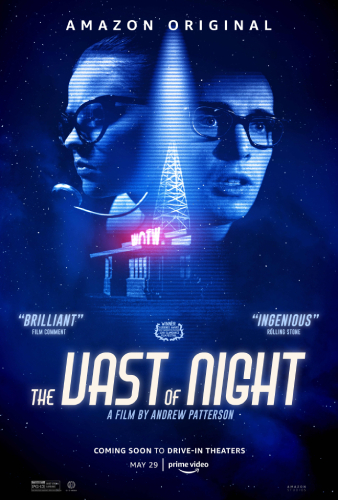
This movie has a sultry stillness similar to the next one on this list. The Vast of Night plays in a New Mexican village in New Mexico in the fifties, where a young radio host and a teenage switchboard operator investigate the origin of strange radio-signals the switchboard operator is receiving. They hear rumors about unidentified objects hovering above neighborhoods and are approached by a man who claims to have been involved in a secret military operation involving UFO’s.
The Vast of Night is reminiscent of Close Encounters of the Third Kind, but it’s not as kinetic. Silence is the key in this movie, and the sort of eerie paranoia typical of the Cold War era.
The camera work and the directing are amazing, beginning with a long flowing scene (which feels as a one-take, but I don’t believe it really is) of the radio host entering a hall where a basketball tournament is about to start. The movie is really people having conversations and moving to and fro through town, but the way this is done is captivating, with loads of atmosphere to boot.
9: Tayarisha Poe: ‘Selah and the Spades‘
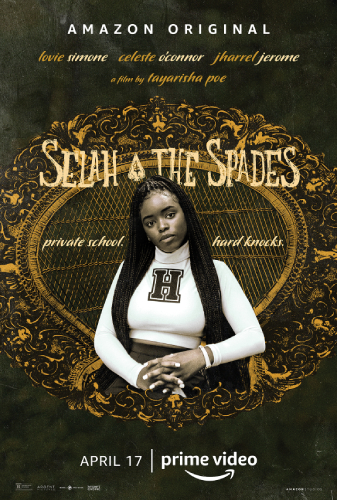
One of my favorite novels is Les Grandes Meaulnes by Alain-Fournier, because of the kind of dreamy, fairy-like world the adolescent characters move in, a kind of limbo between childhood and adulthood. Exactly that feel has Selah and the Spades, about the Shakespearian rivalry between gangs of students at an elitist boarding school. Only for that elusive atmosphere I love this movie but it’s also flawlessly executed, smooth, with great young actors who evoke empathy, as far removed as their character’s world is from ours. From mine, at least. There’s a poetic stillness as in a play performed in the woods at a Midsummer night, also a subdued eroticism and a simmering cruelty. And don’t get me wrong, but it was also a delight to see a movie with black characters that wasn’t about racism and Blackness. Brilliant, this.
8: Omori Tatsushi: ‘Mother‘

Director Omori Tatsushi occupies two spots in this list. Both films put my stomach in a knot. Tatsushi shows us a hard reality that’s hidden for most of us.
Mother is a bleak, depressing, angering mix of Ken Loach’s Ladybird, Ladybird and Hirokazu Kore-eda’s Nobody Knows, about an irresponsible mother of a young boy, constantly bringing in toxic, violent assholes who mistreat her and her son, one of whom gets her pregnant again and then disappears while she spirals down into an ever deepening pit of misery. The boy grows up into a teenager and is manipulated by her into committing an unspeakable crime. I have watched this film breathlessly.
7: Fukada Koji: ‘A Girl Missing‘

Sixty year old Tsutsui Mariko is the best thing about this compelling film. I mention her age because there are damn few films in which the main part is played by women of middle age or older and Tsutsui is such a goddamn gorgeous actress, driven by a nuclear reactor core inside of her.
She plays a home-care nurse who becomes the victim of a media hype after making a wrong decision. She is then betrayed by the woman she entrusted some secrets to. She’s a peculiar woman, but does nothing earth-shocking. We all have done things we are ashamed of.
But her embarrassing past comes out and she’s immediately stripped of all her dignity. She loses her humanity and almost literally turns into a dog. This psychological process is depicted by Tsustsui and director Fukada Koji in such a convincing manner, with Tsutsui drawing upon a wide array of acting skills, the viewer almost becomes her. Her anger, her grief, her fears, her desperate sexuality. It’s very impressive.
A Girl Missing is an indictment against the media and the public, judging en condemning and eventually totally destroying an individual, just based on some hints and suggestions and a total disregard for one’s privacy. This seems to happen more and more these days. That’s why this is not only a beautiful film, but an urgent one too.
6: Ninagawa Mika: ‘Diner‘

Ninagawa Mika’s films are always visually overwhelming, lush and colourful. Diner is spectacular, with dazzling set-pieces, extravagant costumes and, because this plays in a restaurant, mouth-watering, eyepopping dishes and abundant buffets full of colourful fruits, cakes, desserts, meats, a tower of hamburgers between gold-colored buns and everything dripping with juice and sauces. Fire flaming from frying pans, strawberries glistening temptingly.
The story is kind of manga-like: a young woman, played by Tamashiro Tina, is forced to work for a chef (Fujiwara Tatsuya) who runs a restaurant exclusively for killer freaks who wouldn’t be out of place in a Batman comic. She sympathizes with one of them, inadvertently causing his tragic end, and is threatened by another. In the end there’s a spectacular gun fight with people shooting at each other while they fly through the air, not unlike the stunningly choreographed shoot out ballets in John Woo’s movies.
It’s glorious and provided with an exciting musical score by Osawa Shinichi alias Mondo Grosso. A feast for eyes and ears.
5: Alejandro Amenábar: ‘Mientras dure la guerra‘
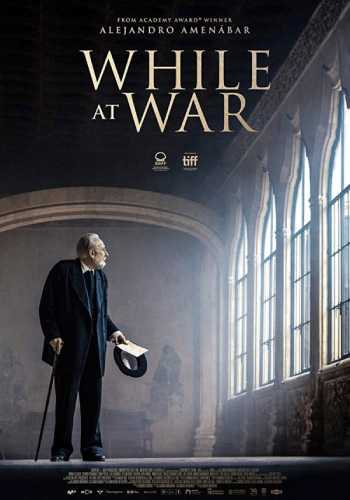
Many people make World War II comparisons these days when talking about the current rise of the extreme right, racism and refugee-related issues. I am often reminded of the Spanish Civil War when confronted, for instance, with the silence of the so-called “moderate middle”, but also the fierceness with which many leftists seem to rather spend their time and energy purging their own ranks of undesirable elements (“binaries”, humourists, dairy-consumers) then to unite and fight the real baddies. Just like the Spanish Civil War, when the Left managed to start a civil war within the Civil War against their own comrades who were of a different leftist nomination and had the wrong convictions.
Anyhow, Mientras dure la guerra (While at War) is about the Spanish Civil War and about one man particular, respected intellectual Miguel de Unamuno (wonderfully played by Karra Elejalde) whose stubborn naivety prevents him to confront the stone cold reality of fascist danger even when his own best friends are arrested and murdered by the Falangists.
Parallel with Unamo’s moral desperation is the rise of fascist leader Franco, an unimpressive figure at first sight, tending to the moronic even in the eyes of his German nazi allies, but in reality a sly and dangerous man who is, however, constantly in fear of making the wrong decisions.
Only at the end of the film Unamo, after having disappointed so many of his family and friends, publicly confronts Franco and the fascists with their crimes, resulting, of course, in his own downfall.
Amenábar chronicles these events with a certain aloofness, not explicitly taking sides. He portrays the fascists as humans who believe in what they’re fighting for. All the violence in the film is off-screen, always in the form of shots and explosions in the distance. We do see the consequences in the form of dead bodies lying at the sides of the roads.
The emphasis is on the interaction of the different characters in the film, fascinating and often intense, focussing on the moral ambiguity of everybody involved, which in fact makes the film more scary than rows of summary executions and beastly cruelty would have. Intelligent and very compelling.
4: Nagahisa Makoto: ‘We are Little Zombies‘
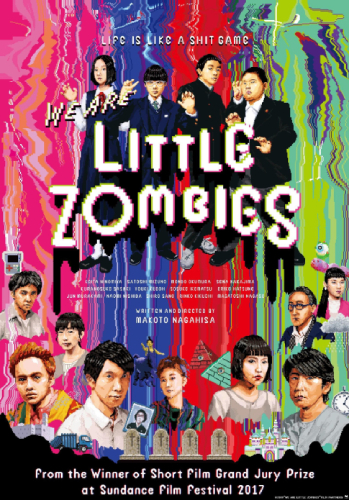
I skipped this movie at the Camera Japan Film Festival last year because of the title and because it is about a bunch of cute kids. I hate movies about cute kids. Boy, was I wrong. I saw this last summer and it’s one of the most visually satisfying, inventive and charming movies I ever saw.
So a bunch of cute kinds meet at the crematorium where they just said farewell to their parents and together they embark on an odyssey through their grieving process, if you will, or to adulthood. They accidentally become famous as a succesful band in a film about loss, grief, growing up, abuse, exploitation and alienation, brimming with so many story and visual ideas, socio-political commentary, existential philosophy, experimental cinematography and playful music that any lesser director would have turned it into a cluttered chaos, but Nagahisa Makoto, originally a director of commercials, keeps it clear and steady, holding all these balls in the air like a veteran juggler.
We are Little Zombies is an aesthetically and narratively meaningful film. And yes, it’s also about a bunch of cute kids, goddammit. More extended review here.
3: Roman Polanski: ‘J’Accuse‘
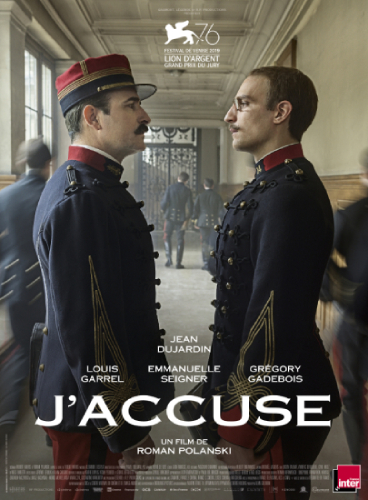
Critics said that Polanski abused the infamous Dreyfus affair (about a French Jewish officer wrongly accused of espionage) as an indictment to his own persecutors (he’s still wanted in the US for a rape he committed in 1977), but that is ridiculous. Central in J’Accuse is not even Alfred Dreyfus himself, but the man who defended him, officer Georges Picquart, an outspoken anti-semite who goes against his own comrades and fellow officers, overcomes his own prejudices to fight for what he believes in: justice and the truth.
The film is a very toned-down reconstruction of Picquart’s struggle against the establishment, the consequences for his personal life and career and his perseverance. Salient detail is that his reprehensible (but at the time totally accepted, expected even) anti-semitism only adds to Picquart’s heroism. He fights for a man he despises for what he is, for what he is born as.
J’Accuse is a subtle and nuanced film, even-tempered, analytical, never angry or demagogic, an excercise in restraint, which makes the story all the more powerful. The cinematography is beautiful, the set pieces gorgeous. A film about being true to yourself and the necessity of disobeying the authorities when they are wrong. Important in a time of rising fascistoid tendencies, even in leftist circles.
2: Miike Takashi: ‘First Love‘
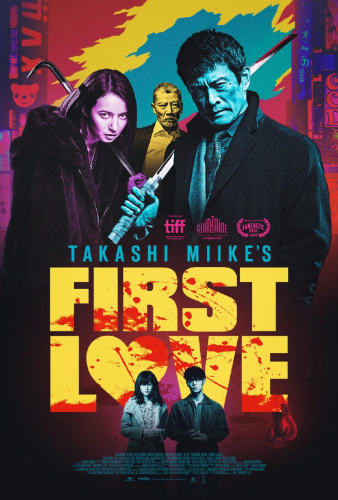
Miike Takshi is a genius director but he makes a lot of trash and, worse, a lot of okayish films. Once in every four or five years he creates a masterpiece, sometimes two in a row (for instance As The Gods Will, and Over Your Dead Body in 2014). First Love is a masterpiece. It’s an inventive, thrilling, engrossing and very funny yakuza movie. Lean and fast and of course over the top, with great actors all around.
First Love is about a boxer diagnosed with brain cancer who bumps into a girl who just escaped the yakuza who forced her into prostitution. Soon they find themselves in the middle of a gang war between a Chinese gang and yakuza, caused by a young and ambitious yakuza who blames the Chinese for a murder he himself blunderingly committed to cover up some scheme he’s cooking up with a corrupt police detective. I especially enjoyed the overacting of puffy pretty boy Sometani Shota, who plays the lying yakuza. More extended review here, but in Dutch.
1: Omori Tatsushi: ‘Taro the Fool‘
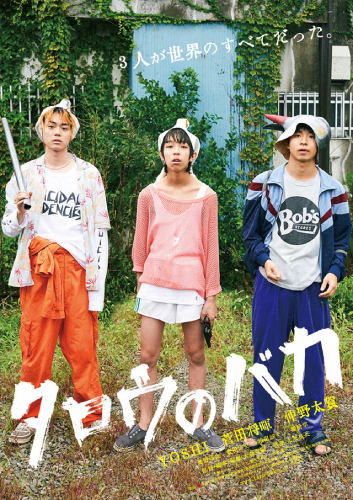
This is the hardest, the most violent movie I’ve seen this year but also the most touching. Plus the lead in this film, a 17 year old model only known as Yoshio making his debut here, is the strongest, most convincing I’ve seen in a while. Yoshio plays Taro, a 14 year old boy who doesn’t go to school and hangs out all day with two violent delinquents. They attack and rob a guy they don’t know is yakuza and find themselves in the posession of a real and loaded gun.
These three teens are extremely dangerous and Taro is a loose canon, an illiterate, totally clueless little asshole. But as it turns out, he is very much the victim of the bleak circumstances he lives in. He lives alone in poverty with his mother, who is not at all able to take care of him and has to survive each new day. Taro is also not without a heart. He and his friends frequent a piece of wasteland somewhere near the city, where a young couple with Down Syndrome hangs out too. In the beginning I thought he was going to harm them in some way, or his friends would, but they never do. While his buddies never acknowledge the pair, Taro sings and dances with them with such genuine enthousiasm it made my eyes moist. They are the only people he can afford to behave as a 14-year old kid with.
He is a pure and wonderful soul, just neglected by society and psychically damaged. Director Omori Tasushi however, known for a couple of pretty disturbing, nihilistic films like The Whispering of the Gods and the number 8 on this list, Mother, is no Ken Loach who explicitly and emphatically spells out his indictments against society. Omori doesn’t morally judge his characters, he lets us decide for ourselves, just by showing the facts.
But it’s impressive how somehow he manages to arouse so much sympathy in me for someone who threatens and bullies people, while he is doing it. There is a scene that’s breathtakingly intense where Taro threatens a woman in a park with the gun he stole. Although she’s scared to death, she still takes pity and we do too. Because he is a poor, pitiful, angry boy you’d like nothing better than to hold and hug, because he did not deserve this.
That, dear people, is what film is about. Shooting a scene in such a way you feel sad for the crook about to shoot a woman, instead of for the woman about be shot. That’s when you managed to plant something in the brains of your viewers, to change something.
There are some pretty violent scenes in Taro the Fool. They are not gratuitious, however (infuriating, yes) and the humanism prevails, the pay-off is huge. This is an important film, a film that truly matters.


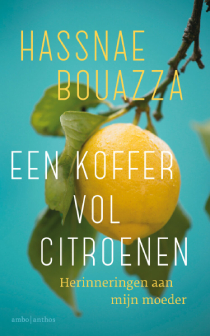
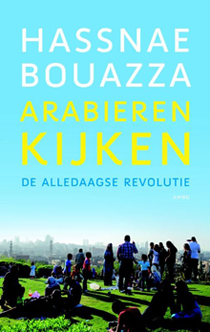

 RSS
RSS